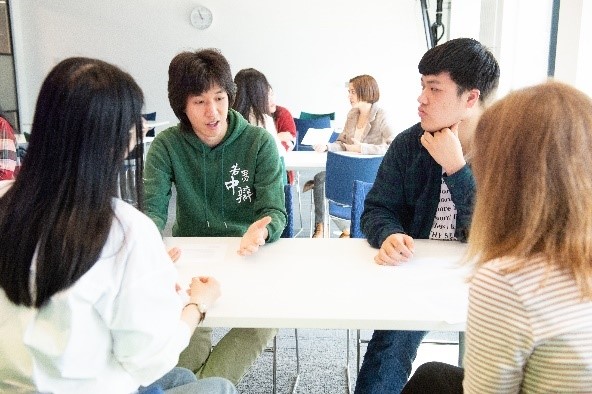By Kathryn Tomlinson (MA History) 
I come from 30 minutes down the road. I could get the bus from the underpass and be home in about an hour. I didn’t have to worry about living in a different country, getting to grips with a different culture, or speaking a different language. But, of course, that’s not the case for hundreds of students at Lancaster. The discussion groups offered by the Learning Development Team in the Library help bridge this gap and are a great thing to get involved in. For an hour once or twice a week, we all come together and discuss a predetermined topic like travel, music, the local area, or – everyone’s favourite – food! (Although showing pictures of everyone’s favourite foods from their country was a bit of a struggle at lunchtime!) The discussion groups are casual and relaxed, there’s no academic knowledge required before coming and no exam at the end of the term. As one of a handful of English Language Assistants, my job was to be a peer facilitator, helping with any questions about vocabulary, idioms or British culture and slang. We were not teachers there to test and correct but fellow students there to help and encourage.
I particularly enjoyed thinking of British idioms and hearing the equivalent in different languages. And it’s always fun explaining about different accents and weird celebrations we have, like egg rolling at Easter! Getting to know both my fellow assistants and the students who came regularly was a pleasure. It was also a joy to see the students’ already great standard of English get better and better each week. I loved being able to talk to everyone, hear their opinions and just have a good social time after the isolation of the pandemic. For those who perhaps weren’t as confident, part of my job was also to try and encourage them to contribute, however much or little, and make sure everyone felt included without feeling singled out. Learning how to do so was a delicate balance but one which you learn to tread more easily as the sessions go by. After a few discussion groups I actually learnt I was more extroverted than I thought – I loved talking to other students and really looked forward to each session.
Having taken some extracurricular German classes too, I was really struck by what a skill it is to speak another language. The students would come to sessions where they didn’t know the topic, the questions, or where exactly the discussion was naturally going to flow, but still understood and contributed. Something I don’t think I could ever do! Learning about other people’s cultures too helped make me a more well-rounded person. Being an English Language Assistant is not only a great opportunity for paid work, it also greatly adds to your student experience. It’s a job I would recommend to anyone and one I’m definitely going to miss.





 I thought long and hard about what I wanted this blog post to be about, and being a newly second year student, I wish the people before me told me a few things before I started the year.
I thought long and hard about what I wanted this blog post to be about, and being a newly second year student, I wish the people before me told me a few things before I started the year.
